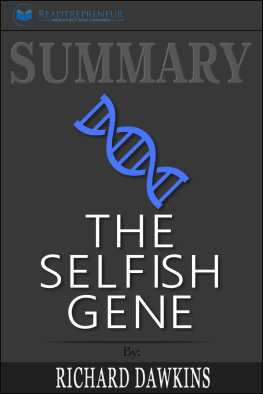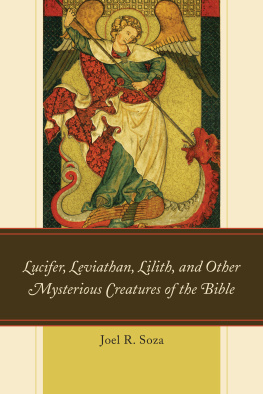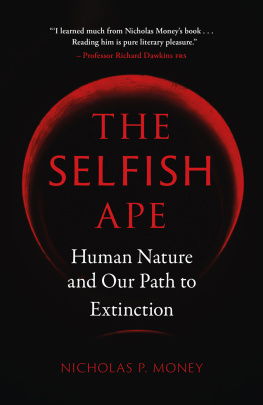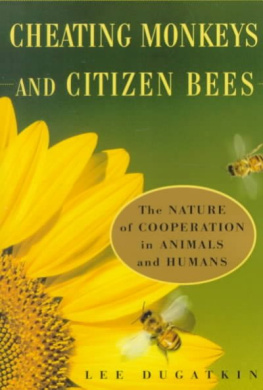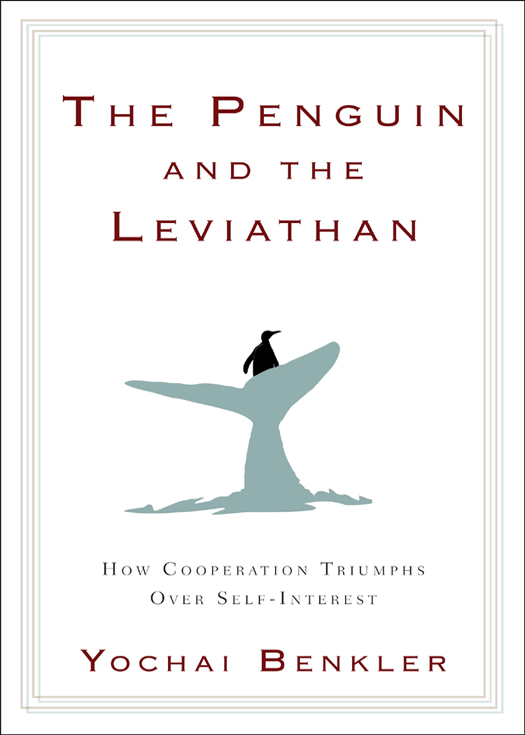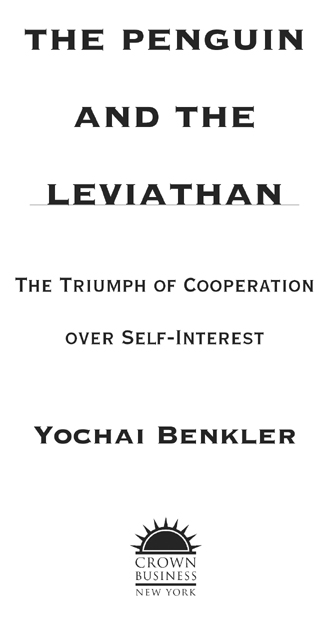Also by Yochai Benkler
The Wealth of Networks
Copyright 2011 by Yochai Benkler
All rights reserved.
Published in the United States by Crown Business, an imprint of the
Crown Publishing Group, a division of Random House, Inc., New York.
www.crownpublishing.com
C ROWN B USINESS is a trademark and C ROWN and the Rising Sun
colophon are registered trademarks of Random House, Inc.
Library of Congress Cataloging-in-Publication Data
Benkler, Yochai.
The penguin and the Leviathan: the triumph of cooperation
over self-interest/Yochai Benkler.
p. cm.
1. Cooperation. 2. Self-interest. 3. Altruism. 4. Identity
(Philosophical concept) I. Title.
HD2963.B46 2011
306.34dc22 2010038576
eISBN: 978-0-307-59019-0
J ACKET DESIGN BY D ANIEL R EMBERT
v3.1
For the millions who, by their acts every day,
small and large, give humanity its name.
CONTENTS

CHAPTER 1

T HE P ENGUIN VS. THE L EVIATHAN
W hat do Southwest Airlines or Toyotas shop-floor processes, Chicagos community policing program, and Wikipedia or Linux have in common? The answer is that they are all systems that have relied on human cooperation, rather than purely on incentive compensation, punishment, or hierarchical control. Toyota structured its shop-floor relations around teamwork, and engineered its supplier relations into a collaborative network built on trust and long-term cooperation, instead of a top-down system governed by process engineers and competitive bidding. Until its recent troubles, for more than two decades its model was seen as revolutionary and the primary reason for its becoming the worlds largest automobile manufacturer. Southwest Airlines similarly has outperformed its competitors by a wide margin, fostering a collaborative team spirit based on relative autonomy, high trust, and a pervasive sense of fair treatment among employees. Rather than cracking down harder on offenses, the Chicago police force has, for two decades, led the drive to a community-based model of policing, in which neighbors and police officers work together to prevent crime more effectively. Wikipedia relies on content created entirely by volunteers, allowing anyone and everyone to contribute their time and knowledge, rather than paychecks or editorial control, and Linux, the open-source software, depends on a massive collaboration between volunteers and paid contributors, whose outputs they all share and no one owns exclusively.
The way these organizations work flies in the face of what has long been the dominant assumption in Western society about human motivation: that human beings are basically selfish creatures, driven by their own interests. For decades economists, politicians and legislators, business executives and engineers have acted as though all systems and organizations had to be built around incentives, rewards, and punishments in order to get people to achieve public, corporate, or community goals: If you wanted to reduce crime, enact stronger penalties, like the three-strikes laws in California that sentence people to prison for life if they are convicted of a third felony. If you want employees to work harder, incorporate pay for performance and monitor their results more closely. If you want executives to do whats right for shareholders, pay them in stock. If you want doctors to take better care of patients, threaten them with malpractice suits so that fear of litigation makes them take better care. The model in all these is the samewe are driven by self-interest; to get others to act well, you have to monitor, reward, and punish them. And yet all around us we see people cooperating and working in collaboration, doing the right thing, behaving fairly, acting generously, caring about their group or team, and trying to behave like decent people who reciprocate kindness with kindness. Nowhere has this fact been more obvious than online, where Wikipedia and open-source software have been so successful. Tux, the Linux Penguin, is beginning to nibble away at the grim view of humanity that breathed life into Thomas Hobbess Leviathan.
Testimony of Dr. Alan Greenspan to the Senate Committee of Government Oversight and Reform,
O CTOBER 23, 2008
Alan Greenspan: Those of us who have looked to the self-interest of lending institutions to protect shareholders equity (myself especially) are in a state of shocked disbelief.
Senator Henry Waxman: In other words you found that your view of the world, your ideology was not right. It was not working.
Greenspan: Precisely thats precisely the reason I was shocked because Ive been going for forty years or more with very considerable evidence that it was working exceptionally well.
Former Federal Reserve chairman Alan Greenspans unwavering belief in the power of self-interest is based on two of our societys most widely held, long-standing, and erroneous assumptions. The first is the assumption that inspired philosopher Thomas Hobbess Leviathan: that humans are fundamentally and universally selfish, and the only way to deal with people is for governments to step in and control us so that we do not, in our shortsighted pursuit of self-interest, destroy one another (or make one anothers lives too miserable to bear). The second assumption was Adam Smiths alternative solution to our assumed selfishnessthe Invisible Hand. Smiths Wealth of Nations argued that because humans are inherently self-interested and human decision making is driven by the rational weighing of costs and benefits, our action in a free market would tend to serve the common good. In other words, in our pursuit of self-interest we would work to fulfill one anothers needs, not because we care about one anothers well-being, but because it is mutually advantageous to do so. Though their prescriptions are quite different, both Leviathan and the Invisible Hand have the same fundamental starting point: a belief in the selfishness of mankind. The former tries to curb and control selfish human behavior through monitoring and punishment; the latter imagines markets as places where self-interest will lead people to act in ways that serve the common good.
The major alternative in Western political thought coalesced from the work of a wide array of thinkers: from French philosopher Jean-Jacques Rousseau, through Scottish Enlightenment philosopher David Hume and Adam Smiths other major work, The Theory of Moral Sentiments, to the work of major anarchist philosophers Pierre-Joseph Proudhon and Peter Kropotkin. Broadly speaking, this far more flattering view sees human beings as fundamentally capable of empathy, of possessing sentiments that compel us to act morally, cooperatively, or generously, not only in our own self-interest. This does not claim us to be saints; it merely says that we are capable of virtue, and that we need not be robotic slaves to the governments Leviathan, automatons guided by the Invisible Hand of the market, or parts of the collectivist Hive of fascism to serve the common weal. In honor of Tux, the symbol of Linux, Ill call this alternative the Penguin.


